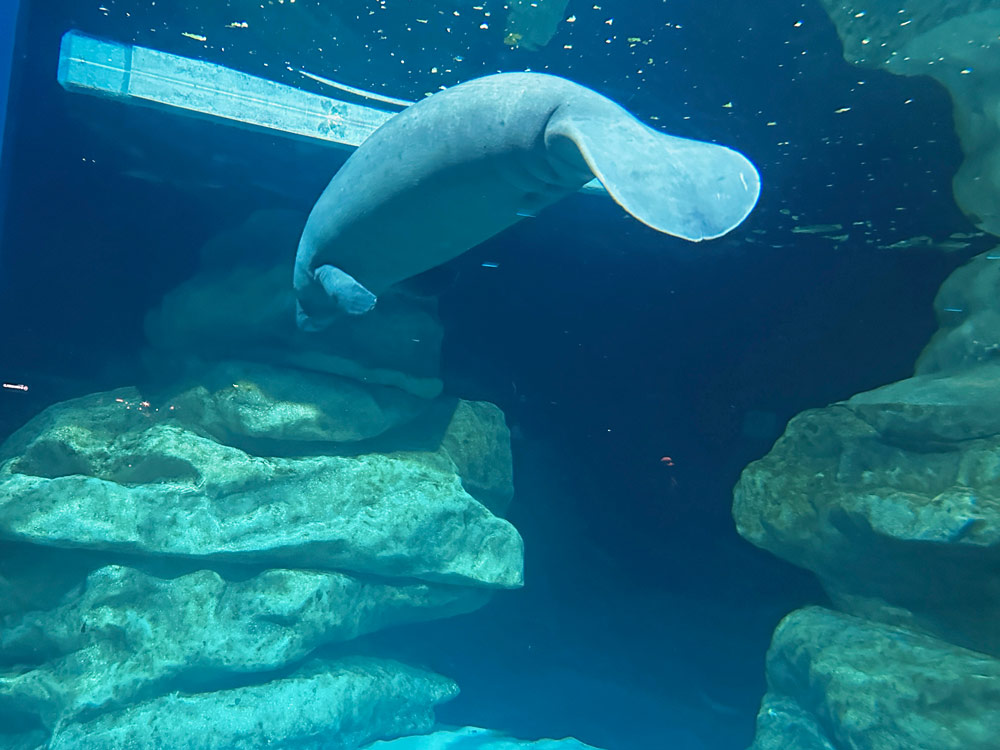
The Florida Department of Environmental Protection is asking a federal appeals court to quickly halt a district judge’s ruling that would require a series of steps aimed at protecting manatees in the northern Indian River Lagoon.
The department last week filed a motion that argued the 11th U.S. Circuit Court of Appeals should stay an injunction issued May 19 by U.S. District Judge Carlos Mendoza that included requirements such as temporarily preventing new septic tanks in the lagoon area. The state says the injunction should be put on hold until an underlying appeal of Mendoza’s ruling can play out.
Attorneys for the department said in the 26-page motion that parts of the injunction are scheduled to take effect as soon as June 17. The motion raised a series of issues, including targeting the moratorium on new septic tanks, which discharge nitrogen that can cause harmful algae blooms in waterways.
“The indefinite moratorium on the construction of new septic systems further threatens to impede commercial and residential development in the state,” the motion said. “Florida law specifically authorizes construction using ‘nutrient-reducing onsite sewage treatment and disposal systems’ or similar nitrogen-reducing ‘wastewater treatment systems.’ And the third-party property owners and developers affected by the court’s decree have no ready means to challenge this moratorium, as they are not parties to this action (the lawsuit).”
Mendoza’s injunction came after he ruled April 11 that the state violated the Endangered Species Act in the northern Indian River Lagoon, which is primarily in Brevard County but also goes into southern Volusia County. Mendoza sided with the environmental group Bear Warriors United, which argued that wastewater discharges into the lagoon led to the demise of seagrass, a key food source for manatees, and resulted in deaths and other harm to manatees.
The state has appealed the April 11 ruling and the injunction to the Atlanta-based appeals court. In last week’s motion for a stay of the injunction, it argued, among other things, that Bear Warriors United had not shown legal standing in the case and that the Florida Fish and Wildlife Conservation Commission — not the Department of Environmental Protection — is responsible for issues related to wildlife such as manatees.
In addition, the motion pointed to a proposal issued in April by federal wildlife officials that the state’s attorneys said would “significantly amend” Endangered Species Act regulations and make the case moot.
A key part of Mendoza’s injunction calls for the state to seek what is known as an “incidental take” permit from the U.S. Fish and Wildlife Service. That process would include the state developing a conservation plan, which could provide “permanent protection and management of habitat for the species,” according to information about such permits on the federal agency’s website.
While the incidental-take permit request is pending, Mendoza ordered the Department of Environmental Protection to not issue permits for constructing and installing septic systems in a northern Indian River Lagoon watershed. Mendoza also ordered the establishment of biomedical-assessment and supplemental-feeding programs for manatees in the area.
The septic-tank moratorium would start July 17, while the requirements about assessment and feeding programs would take effect June 17.
In his April 11 ruling, Mendoza wrote that under the Department of Environmental Protection’s regulations, it would take at least a decade for conditions in the northern part of the Indian River Lagoon to start to recover.
“This is due to the previously and currently permitted discharge of legacy pollutants via wastewater into the north IRL (Indian River Lagoon),” Mendoza wrote. “These legacy pollutants caused the death of seagrasses — the manatee’s natural forage — and the proliferation of harmful macroalgae. Legacy pollutants, as their name suggests, persist in the environment and cause harmful effects long after they have entered the system.”
Bear Warriors United filed the lawsuit in 2022, after Florida had a record 1,100 manatee deaths in 2021, with the largest number, 358, in Brevard County. Many deaths were linked to starvation.
The state had 800 manatee deaths in 2022, before the number dropped to 555 in 2023 and 565 in 2024, according to Florida Fish and Wildlife Conservation Commission data. As of May 23, 383 manatees deaths had been reported this year, including 79 in Brevard County, the most of any county in the state.
Manatees are classified by the federal government as a threatened species.
–Jim Saunders, News Service of Florida





























Kat says
You can’t make this shit up! Am I reading this correctly? The Florida Department of environmental protection is fighting a ruling trying to make it do its job. It’s taking the side of the developers over the fate of the manatees?
Robin Holman says
This is insane.We have lost so much habitat for these native endangered species.They should be on the critical list.There beautiful and gentle 💔💔💔💔💔
Fritz Bertoch says
This is a 180 degrees out from what the responsibility of FDEP is supposed to be doing. Environmental Protection is the name and protecting the enivironment is the job. Isn’t the river an environment for living species such as water/sea grass, fish, mollusks, MANATEES, etc.??? FDEP is leading the way with grants for utility systems for the Septic-to-Sewer Program to remove septic systems since they lead to auquifer and drinking water contamination. It would appear to be a direct controversy of the FDEP mission to obtain a stay to this court order. Seems to be some top tier officials in league with developers to line thier pockets.